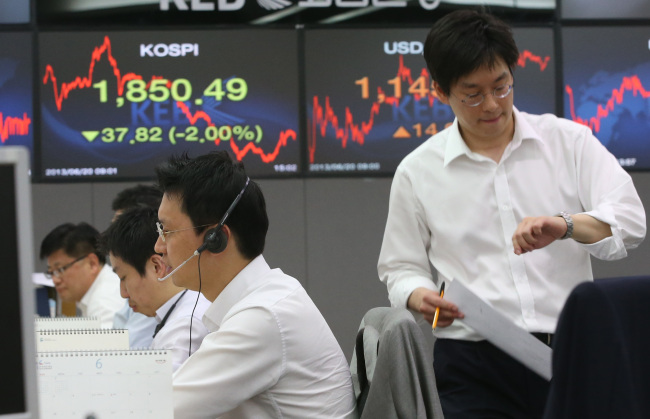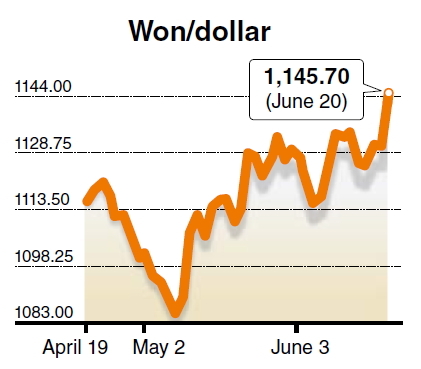 |
Traders at the headquarters of Korea Exchange Bank in Seoul look at financial indices on computers on Thursday. (Yonhap News) |
The Korean financial markets tumbled Thursday after the U.S. Federal Reserve unveiled plans to phase out its quantitative easing that led investors worldwide to unload their stocks.
The Korean benchmark KOSPI declined for the second straight day, finishing at 1,850.49 on Thursday. It fell 2 percent from Wednesday, following an overnight loss on Wall Street where the Dow Jones Industrial Average fell more than 200 points.
The Korean won fell about 15 won to a year-to-date low of 1,145.7 won to the U.S. dollar as demand for the safe-haven greenback gained momentum on the back of the U.S. recovery expectations.

Korea, susceptible to external macroeconomic conditions given its high exports exposure, would need to be on alert to the possibility of increased capital flow and foreign exchange volatility stemming from the sequenced reversal process of the Fed’s unorthodox monetary policy.
Bank of Korea Gov. Kim Choong-soo recently foresaw this systemic risk, saying that the cost of advanced economies’ exit from quantitative easing would “not be low” for Korea, and that policymakers need to stand by to tame potential financial instability.
The Fed’s planned halt of asset purchasing next year is expected to accompany a rate hike as the world’s largest economy improves this and next year. U.S. growth is expected to reach 3 percent in 2014, and the U.S. central bank aims to keep inflation in check at 1 percent, analysts said.
The Fed said it would gradually conclude its quantitative easing as long as the unemployment rate falls below the 7 percent threshold. This range is the usual target as a high job rate could result in an unwanted outcome of higher consumer prices.
A rise in the U.S.’ key rate could trigger a “risk of global interest rate rises,” BOK Gov. Kim said during his speech to commemorate the 63rd anniversary of the Korean central bank last week.
This would lead to a fall in bond values that could preemptively lead Korean financial institutions such as banks to boost their capital buffers.
The fall in Korean stocks and currency prompted financial regulatory authorities to calm investors by keeping close tabs on the markets and assuring them that there was nothing to fear, as the country’s financial system is prepared to counter any disruptions from the QE tapering.
“Global financial markets will soon stabilize as uncertainties wane following the announcement of the Fed’s timeline for a QE exit,” said Yoon Chang-yong, an analyst at Shinhan Investment.
By Park Hyong-ki (
hkp@heraldcorp.com)









